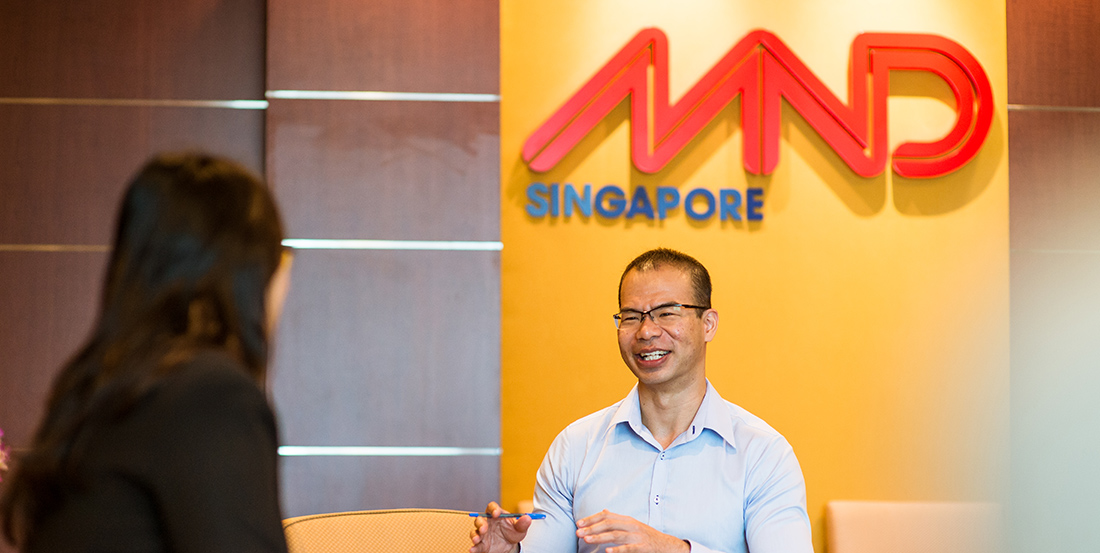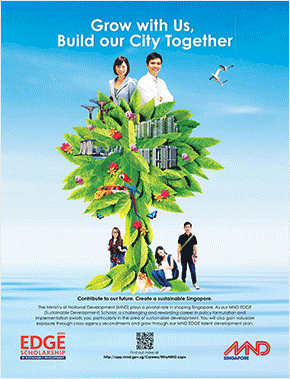S ingapore is our home. This is where our friends and families live, where a comfortable built environment surrounds us, and where we have an array of delectable foods to satisfy our palates. From developing world-class infrastructure to creating a vibrant and sustainable living environment and building cohesive communities, MND plays an integral role in shaping Singapore.
To drive Singapore’s development, MND also facilitates the development of the people who have a hand in shaping Singapore’s future. One of the ways that MND develops and nurtures the capabilities of passionate individuals is through the MND EDGE Scholarship (Sustainable Development), which provides an avenue for pre-university students to pursue their undergraduate studies in sustainable development-related courses, including engineering, urban studies, urban planning and design, environmental science, economics, sociology, geography and other related disciplines. The scholarship is one of the seven undergraduate scholarships offered by the MND Family. In addition, the MND EDGE Postgraduate Scholarship also gives MND employees the opportunity to upgrade themselves. MND EDGE Postgraduate Scholarship recipient Yeon Wen Cong tells us about how he has benefitted from this opportunity.
How have you benefitted from your postgraduate degree?
Yeon Wen Cong: The decision to take up the MND postgraduate scholarship to pursue my Master’s degree in Business Administration at INSEAD was a clear choice for me. My MBA education opened my eyes to how the economy, businesses and financial industry work, which I was not exposed to during my undergraduate studies in Engineering and work in MND. This exposure allowed me to gain a more nuanced perspective towards policy formulation – I am able to see policy through the lens of a business person as well.

Yeon Wen Cong
MND EDGE Postgraduate Scholar
Deputy Director / Infrastructure
Please share with us about your role in MND before you started your postgraduate journey.
Wen Cong: Before pursuing my MBA studies, I was appointed Deputy Director of Corporate Development at the age of 33. It was the most challenging period of my career, but it was also when I learnt the most. I supervised four teams of about 20 staff, and the teams covered diverse areas such as engagement, events, parliamentary matters and knowledge management. This portfolio stretched my abilities in many ways – I learnt how to engage, influence and build goodwill with people, how to run events and think on my feet to deal with unpredictable changes and how to come up with various systems, processes and incentives to streamline the work flow and boost productivity.
What did you like about your job?
Wen Cong: The job presented me with boundless potential and possibilities. My exposure to different work areas had been tremendous, and I believe it would be difficult to get the same amount of exposure in any other organisation. Prior to my MBA at INSEAD, I was rotated three times in the span of six and a half years, and was responsible for portfolios in three different departments – Corporate Development, Research & Planning, and Finance. After my MBA at INSEAD, I joined AVA for a nine-month secondment to cover animal management policies. I am currently at MND HQ’s Infrastructure division to oversee and review construction-related policies. I believe in T-shaped development to acquire both knowledge breadth and depth – having gained knowledge breadth, I would like to develop knowledge depth in my current posting.
What are some of the challenges you have faced in your career thus far, and how did you overcome them?
Wen Cong: One of the challenges I faced was to set up an engagement unit in MND. I was involved in charting the direction and work plans of the unit, and in recruiting an entire team of officers to work with me in achieving our goals. As a new unit, we managed to achieve a lot of “firsts”. For instance, we initiated a new IT system to manage MND Family volunteers. We organised the inaugural MND Huddle event to recognise and show our appreciation to MND Family volunteers. We also launched a quarterly newsletter to raise the profile of our volunteers. I was fortunate to get guidance and support from my bosses.
Another challenge that was particularly memorable was my involvement in the coordination of MND’s response to the haze crisis in 2013. This was when Singapore experienced record high levels of haze. I helped to secure face masks for officers from the MND Family (including the MND Statutory Boards) for use while working on the ground. Simple as the task sounds now, it was a stressful period due to shortages in the availability of N95 masks. The assignment was particularly meaningful to me as my work directly helped a large number of MND Family officers.
You also attended the MND EDGE Programme. What insights did you gain from the programme?
Wen Cong: The MND EDGE programme facilitated networking with young leaders from the MND family of agencies. It was insightful to learn how AVA, BCA, CEA, HDB, NParks and URA work together to realise the common vision of making Singapore an Endearing Home and a Distinctive Global City.
What advice do you have for aspiring MND EDGE (Sustainable Development) scholars?
Wen Cong: During my last Statistics class at INSEAD, the professor asked the class to think about how to prove our ‘p-value’ in our organisation. In Statistics, the p-value is defined as the probability of obtaining a result equal to or ‘more extreme’ than what was actually observed. These parting words from the professor resonated strongly with me. It is a reminder to develop my competitive advantage so that I can contribute in my own way to the organisation. I encourage scholars to try out different things during their studies to develop their own ‘p-value’ too!
Aspiring scholars should be clear that job satisfaction in the public sector should not be derived from dollars and cents. Rather, your job satisfaction should be derived from seeing your work take shape and improving Singaporeans’ lives. In MND, this means creating a good living environment with well-designed housing estates, lush parks and greenery, and forming an impressive skyline!

